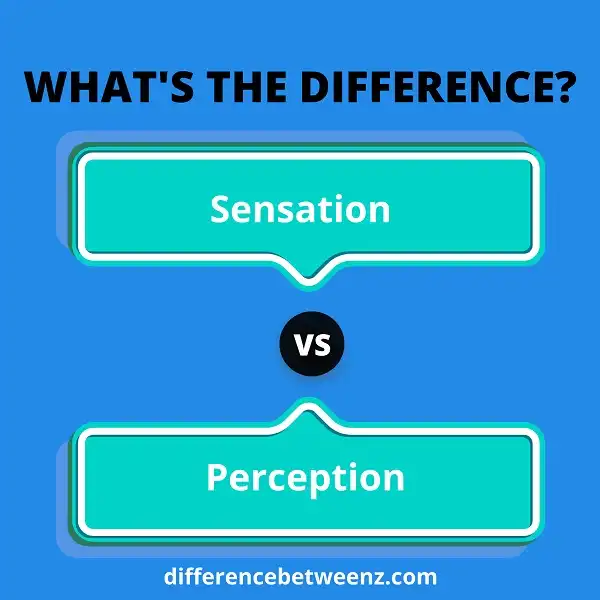Sensation vs. Perception
Difference between Sensation and Perception: – The words “feeling” and “perception” are related to each other, which make them very easy to mix and confuse the definitions of the two. In this entry we will be responsible for establishing as clearly as possible the Difference between Sensation and Perception, so that in this way you do not confuse and use them indistinctly; which would be a mistake.
Difference between Sensation and Perception
Sensation
The sensation is essentially the “feeling “, what we feel with our senses. Sensations are the things of our environment that are recorded by the five most important sense organs.
Sensations are what we see, hear, smell, taste and feel (touch). It is the operation and function of the senses or the ability to receive stimuli through them.
It can also be said that sensation is the physical result of the stimulation of any sensory organ; In addition, this concept can refer to internal changes of the body, such as cold or pain.
Physiologically speaking, sensation is the faculty to perceive the stimuli.
Another definition that can be given to the concept of sensation is the following: it is a state of excited feelings or interest that awakens among several people or in a whole community, some rumor or event relevant to them.
For example: “The premiere of the new film by Angelina Jolie caused a sensation among her fans.”
Perception
Moreover, l to perception is our way of interpreting the sensations. That is, that helps us to give meaning to our sensations.
It is the act or faculty of apprehending through the senses or the mind; cognition or understanding. It consists of r ECOGNITION or appreciation immediate or intuitive, as for example with the qualities moral, psychological or aesthetic. It is to have the vision, the intuition and the discernment of things.
In psychology, perception is called a unified consciousness derived from the sensory processes while a stimulus is present.
The main difference between sensation and perception is that sensations are the passive process of obtaining information from the outside world to the body. Perception, on the other hand, is the active process of selecting, organizing and interpreting information sent to the brain through the senses.
The sensations are passive, in the sense that we do not have to be consciously participating in a process of “detection”, since our senses do this naturally all the time. However, in perception our brain plays an active role: it interprets sensations.
Sensation is the process by which our senses collect information and send it to the brain. Humans are able to detect a large amount of information at a given time, such as; the ambient temperature, the brightness of the lights, hearing someone speaks a distant train or the smell of perfume. However, due to l information overload, our brain does not interpret it all.
Another example, if you are talking to someone; you may not realize that someone else has just entered the room, even though you probably could hear the creaking of the door and its steps. In this case, what happens is that t u brain does not interpret the information and therefore not perceive the person entering.
Because of this “selectivity” of our brain, most of our world is not perceived by us. Scientists estimate that we see 11 million bits of information per second. However, we interpreted only 40 bits.
In addition, the perception can be configured by the learning, the memory and anticipation. An example of this and is an easy way to distinguish between sensation and perception is : c hen we see a building from afar , seems small and c then walked toward the building appears to be made larger; at least that’s what our eyes see . However, we do not exclaim with surprise that the building is growing or is being reduced; this is because we know that the building is the same size it always was and we understand (because we have learned it) that it is only our relative distance from the building that makes it look like this.
Another example of how learning, memory, and expectation relate to perception is when we play to find the differences. If something has changed, it has been moved or eliminated altogether; we can tell the difference. Our eyes see the element that appears and we perceive that something is different from the previous one.
Key differences between Sensation and Perception
- The sensation refers to the use we make of our senses, while perception is the interpretation we make of the things our senses capture.
- Sensation is a passive process, since our senses have sensations all the time without the need for us to be aware of them; but perception is an active process in which our awareness, focus and interpretation are required.
- The sensations are natural and spontaneous, while the perceptions depend a lot on our learning, memory and expectations.
- In our sensations the five senses intervene, while in the perceptions the one who does “dirty work” is the brain.


